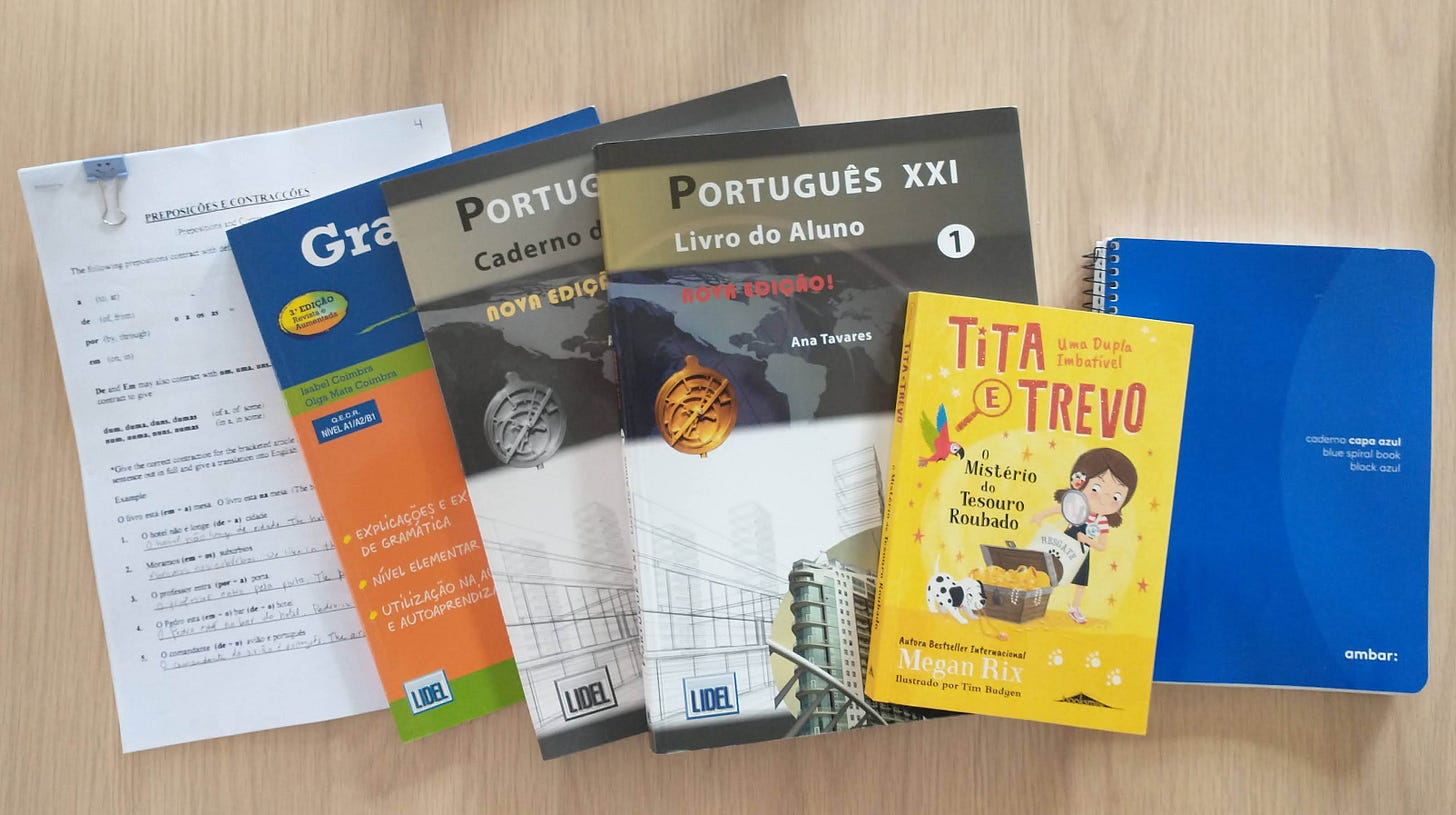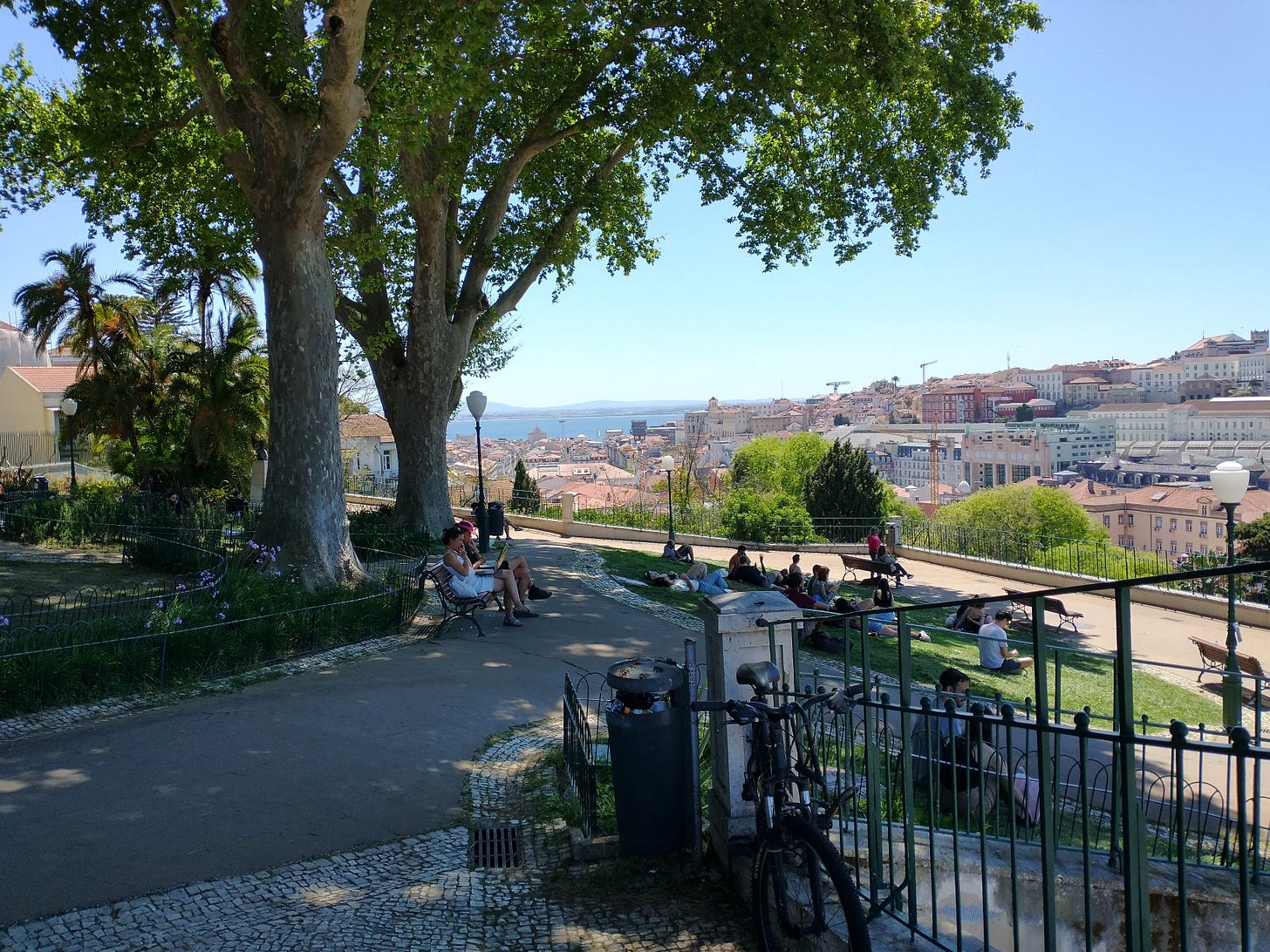A key reason we chose Portugal is that it scores highly on English fluency. A key reason we chose a major city is that English is more common in the cities. People were complaining that in Lisbon and Porto they were having difficulties getting opportunities to speak Portuguese. That’s the place for us, we figured. Easy landing space, and from there we acclimate, learn the language, and figure out where to move.
This fiction that “everyone here speaks Portuguese” would be funny if it didn’t affect our lives so much. Far and away this has not been our experience.
Here’s an example from Amy
I was at private hospital in Lisbon, and needed to make an appointment with a doctor in 12 weeks. I got my ticket, waited my turn, and then went up to the receptionist. The lovely lady did not speak any English. Not the usual “I don’t speak any English because I don’t feel confident in my English, when actually I’m pretty good.” None, zilch, squat. No problem at all. Feeling up to the task, I said doze semanas. I said my name with the correct accent. The receptionist found me in the computer. I even said what she needed to know: the treatment name which is pronounced the same in English or Portuguese and added consulta. The receptionist knew what I meant. I was patting herself on the back, rather vigorously. It’s amazing I didn’t go sprawling.
Then, the challenge of finding a date. This took longer than usual, more frowning and hmming from her. No problem, I’m still busy congratulating myself. She offered me a date. In Portuguese naturally. Hmm. I didn’t understand it. She tried again. To me it didn’t sound like anything I’d practiced. She wrote it down on a piece of paper. Yay! She presented the piece of paper. Now, not everybody is blessed with the best of handwriting. There are some people, like my husband, who have indecipherable handwriting. I could not make out a single number that she has scribbled down. She turned to the lady next door. They consulted. They got nowhere. Lady 2 also spoke zero English. A third lady appeared and leaned over their shoulders. She started talking with them in Portuguese. She's hmming and frowning. Listening intently, I manage to catch … something when the situation was being explained to the third lady. And I said não dois. Doze. They all looked at me. Perhaps my dois (2) and doze (12) are very similar, or maybe my doze was too much like dos in Spanish. The newest lady said DozAY? I nearly shouted sim sim!!! And thus I learned how to say 12.
Our Portuguese studies thus far
We began learning the language when we were still in the US. This mostly consisted of the app Memrise, since that platform has European Portuguese and is more fun than Duolingo (which teaches Brazilian Portuguese1). Memrise does brief videos of locals pronouncing words. For example, there’s this guy who’s a riot. When he says triste (sad), he sounds and looks like Droopy Dog.
After we arrived, Amy kept up her Memrise, and Scott did 10 lessons with a tutor online. Which was more effective? Tutor. Hands down. Completely worth the cash. Amy would walk into a store and have only Onde de…. (Where is…) and eventually hand over her translator app. Scott would be able to carry on a small conversation. It was awe inspiring.
Do we really need to learn the language?
We see two main reasons to learn Portuguese (other than the fact that it’s not our country and we’re guests here):
To make our lives easier.
To earn either Permanent Residency or Citizenship after we’ve been here five years.
Ways our lives would be easier if we knew more than a smattering of Portuguese
Asking where something is in a store, being able to say hi and carry on a small conversation without completely freezing up are challenges at this point. Here’s another example: In the U.S. we didn’t like the phone. Here, we are panicked by the phone. You answer in a very nervous Olá?, fingers crossed, dreading the eruption of Portuguese to come.
Or, having to make a phone call.2 Which is worse? Getting a person and trying to fumble through until they take pity on you and transfer you to their one colleague who speaks English? Or getting the completely indecipherable automated answering service.
“Welcome to XY Corp. Your call is important to us. We’re sorry we’re not able to speak with you now. Our normal business hours are Monday through Friday 8 AM to 7 PM, Saturday from 9 AM to 1 PM. If you want customer service, hah. To leave a message, press 1. For billing, press 2. To speak with a representative, please stay on the line. If you want, we can call you back. Press 3 to have someone call you back. You will not lose your place in line.”
At blazing speed, we haven’t a clue. We’ve lost count of the number of people who, like us, have tried to put the phone up to another phone or a computer, in the vain hope that a voice translator app would be able to decipher what the service is saying. We’ve yet to have success.
Having the opportunity to stay in the country long-term
The law has changed so there’s some misinformation out there. The only two ways to receive either Permanent Residency or Citizenship after five years are to:
Pass the CIPLE language exam
or
Take and pass a government-sponsored A1 and A2 level class
That’s right. There’s a (free) government-sponsored class that gets you out of the CIPLE (Certificado Inicial de Português Língua Estrangeira or Initial Certificate of Portuguese as a Foreign Language).
Fabulous! Sign us up!
Not so fast.
The class can, apparently, vary wildly depending upon students and/or teacher. We have heard of people whose classes met for six hours a week with minimal homework and a helpful instructor. We’ve heard of 15 hours a week in the classroom plus almost the same number in homework. We’ve heard some where everyone was beginner, and others where almost everyone already spoke rapid-fire Portuguese and just needed the reading and writing training.
The classes are popular and can fill quickly, especially in bigger cities. We had some challenges registering and by the time we’d gotten them resolved in early January the spring semester, which started in February, was closed for enrollment. The next semester wasn’t until September.
That’s a long time to wait. We needed to fill that gap.
Scott is using SPEAK
I stumbled on SPEAK shortly after arriving here. The organization relies on volunteers to lead (be a “buddy” to, in Speak parlance), “participants” in “discussions” that are usually ten or fewer people and can be either online or in-person. They have a somewhat standardized curriculum (that buddies are free to alter or ignore as they see fit) and they offer three levels of Basic language groups (Basic, I, II, and III) and a Conversational level in several different languages, including English and Portuguese. My introduction to SPEAK came when I served as a co-buddy for a Conversational English language group3 last fall. It was a lot of fun even if there were nights when Andre and I almost out-numbered the participants.
In April, needing support for Portuguese, I joined an online Basic I language group - and was concerned when the buddy was Brazilian.4 She seemed somewhat familiar with the major differences between Brazilian and European and willing to acknowledge and point them out so I stuck with it. Then she got sick and the group disbanded. A new Basic I group was just forming so I joined; that turned out to be one of the best decisions I’ve made in the last 12 months.
The buddy, Filipa, is nothing short of amazing. It’s her second time through a buddy cycle so she’s in that sweet spot between being brand new and on auto-pilot.5 She’s willing to learn, laugh, and share along with the group; the Basic I discussions went by quickly. I’d picked up enough of the language that there wasn’t a ton of new vocabulary every meeting6 but I learned something each time I logged in - the most interesting tidbits often coming outside of what was on the slides as we asked questions about culture or etiquette.
Four or five us from Basic I followed Filipa into Basic II and have been joined by four or five new folks and it’s every bit as fun. This group will end in early August and Filipa will likely run a Basic III after that.
Amy found a tutor
We were at a dinner party, and it turned out one of the people we met was a Portuguese tutor. Ears perked, I reached out, and the tutor agreed to take me on. Vanessa has turned out to be wonderful - encouraging and supportive with a great structure to her curriculum. Frankly, I define nervous student - my brain is far from what it once was! Add to that, it never liked learning languages to begin with. I still don’t understand this whole put-the-accent-on-the-right-syllable in English! Vanessa and I meet online once a week, and the homework is very helpful. One of the three books comes with a bunch of downloadable audio tracks to help with listening to the language.

Where things stand
Recently, out of the blue, Scott was checking his junk email folder. He spotted an email from Português Língua de Acolhimento. Amy had previously noted that in her junk email and blown right by it.
This was the long-awaited email (that Amy had given up on ever getting) informing us we had spots reserved for the September semester A1+A2 language class. All we had to do was show up at the school the following week (um, not a lot of notice?) with 20€ (um, free?) to sign up for a class that will meet for 3.5 hours a night, 3 nights a week. For at least 15 weeks.
Registration is now done. Scott is chomping at the bit, Amy is suspecting she’ll get a week or two in and have to stop. If nothing else, that’s migraine and headache time for her.
Wish us luck, and yes, we’ll let you know how it goes!
That’s all for now.
Love from Lisbon,
Amy & Scott
There are varying opinions on how important it is to learn European Portuguese as opposed to Brazilian Portuguese. As we speak to more Brazilians and Portuguese, though, it seems like there are enough significant differences between the two that it doesn’t make sense to learn one if you’re going to be living every day with the other. Probably, you’ll use some words in conversation that will make a Portuguese native think, “Oh, that’s Brazilian.” It’s also entirely possible you’ll say something mildly insulting without even realizing it (and nobody will point it out to you because they understand you’re still learning the language so they won’t be offended, which means you’ll walk around cavalierly calling women prostitutes for a while).
after you’ve exhausted all other options and delayed a few days hoping the problem would spontaneously resolve
all of the instruction and conversation took place in the target language. It’s the only discussion I am qualified to lead as I do not have a “rescue” language to fall back on if English isn’t understood by the participants.
See footnote 1, above.
She’s also kind, helpful, and was willing to come to our housewarming party even though we’d only seen each other through our computer screens and in a group setting. She has quickly become a friend.
we covered topics like greetings, animals, family members, colors, professions, hobbies and the differences between the verbs ser and estar … basics







Thank you for pouncing on the information that "everybody speaks English." EVERYONE who speaks a foreign language does so on a unique level of understanding, confidence, and vocabulary and accuracy.
I had major surgery. The surgeon trained for years at the Mayo Clinic. As near "flawless" as his English is, there were still misunderstandings and times when things needed to be clarified, repeated numerous times, or said in a different way.
Almost forgot. We always answer the telephone, or door chime with "hello" instead of ola. It immediately tells the person they are dealing with an estrangero. It is a little rude, but it defines our relationship, and kind of gives them responsibility for my communication short-comings.
I had to laugh when you wrote about phone phobia. We drove all the way back to the Worten where we bought our washer and dryer to make sure we had purchased a self venting dryer. Despite over a year of Duolingo and Memrise, I was too afraid to call to get the info. It turned out fine and I was able to fill out our warrantees completely in Portuguese. I know I can read it. But I’m petrified to actually speak it. Our classes at the local high school start in September!